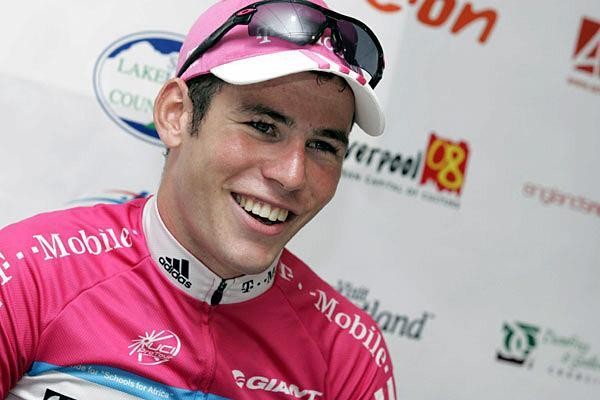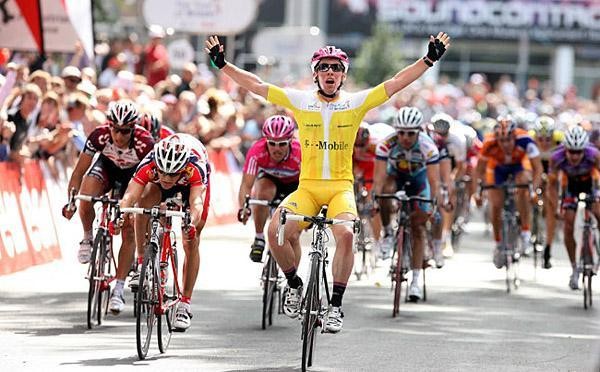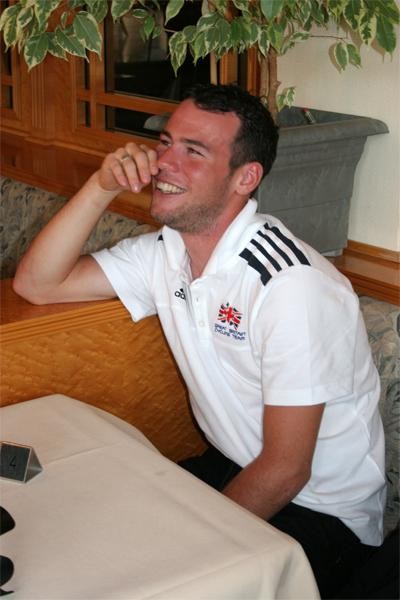Talent, confidence and raw ambition; the mark of a champion
Mark Cavendish has made headlines for all the right reasons in 2007. He's taken an astonishing...



An interview with Mark Cavendish - Part one, October 15, 2007
Mark Cavendish has made headlines for all the right reasons in 2007. He's taken an astonishing eleven wins in his debut professional season and, as the first signatory of the UCI's Riders' Commitment for a New Cycling, he has shown that he is part of a new generation so vital to the sport. Cyclingnews' Shane Stokes spoke recently to the prodigious sprinter about his year, his Olympic ambitions and his goal of winning the Maillot Vert.
With his first pro season done and dusted, and a well-deserved break coming up, T-Mobile's Mark Cavendish has provided three clear signs that he could become the force in world sprinting in the years ahead.
The first of these is the blend of speed and self-confidence which saw him take an outstanding eleven wins in 2007. The second is the ambition which drove him to keep chasing victories right up to his last race of the road season; many other riders might well have eased back and soaked up the success, but the 22 year-old remained focussed and hungry for more.
The third is the fact that he exceeded Robbie McEwen's own professional debut tally of eight European victories, beating the mark set by the man who subsequently became one of the world's best sprinters. It bodes well for his future, and suggests that his goal of taking the points jersey in the Tour de France could be within his scope.
Cavendish is very young and only this season gained experience in the world's top races, but he's been showing his speed for quite a while. As an amateur he gathered strong results in many decent events; in 2005 he took gold medals on the track in the Madison world championship title race and the European championship points race event, as well as sprinting to third on a stage of the Tour of Britain.
One year later he netted gold for the Isle of Man at the 2006 Commonwealth Games scratch race while still just 20 years old. His road results included under 23 victories in the Course de la Solidarité Olympique, Thüringen-Rundfahrt and Berliner Rundfahrt [stages 3b and 4], as well as second overall in the classification of the latter event. He fared well against the professionals too, netting top three placings in the Tour of Britain [second on stages four and five plus third on stage six] and the Tour de Langkawi [second on stage eight].
The latest race content, interviews, features, reviews and expert buying guides, direct to your inbox!
The Manxman had been racing with Team Sparkasse but its close ties with T-Mobile plus his strong season results saw him begin a trial as stagiaire with the German ProTour team. His aforementioned performances in the Tour of Britain secured him a professional contract with the squad, which was in the process of a clear-out and total reconstruction following the Jan Ullrich-Operación Puerto affair. Cavendish's clear anti-doping stance gelled perfectly with what the new general manager, Bob Stapleton, was aiming to achieve and he fitted in well. However, not even Stapleton could have foreseen just how successful 2007 would be.
One big difference between Cavendish and many other first year professionals is that he has had the form and, equally importantly, the confidence to take on the big names. Talk to him for any length of time and this confidence bubbles to the surface; he knows he is gifted, he knows he is fast, and so he consequently hurtles towards the finishing sprint fully believing that he can be first to the line. Has he always been confident in what he can do?
"Well, if you speak with my coach Rod [Ellingworth], as an amateur I never lunged for the finish," he answered, speaking to Cyclingnews in Stuttgart at a media briefing for the 2008 T-Mobile line-up. "I never had to lunge for it; I could always celebrate crossing the line. When you are doing that as an amateur, everybody tells you that it is going to be different when you're a professional... Okay, of course it is different, but I was so quick that I was not going to be that bad [once turned professional].
"People say, yeah, he can sprint against the amateurs but can he sprint against the professionals? Well, if you are sprinting against the amateurs and winning by so much, well then of course you can sprint against the professionals."
That self-belief and speed led to an early vote of confidence by the team, who put some of their most senior riders working for him during his trial last summer. At first he rode for them, and then they repaid that effort on what was home soil for him.
"I was lucky to get the opportunity to sprint as a stagiaire," he stated. "A lot of guys in that position don't get that. In my first race [during the trial], I just got put on the front. I had never done more than 200 metres on the front in my life, but I was put on the front riding with all the regular team. We got a first and second [in stage three of the Regio Tour International] with Mick Rogers and 'Klodi' [Andreas Klöden], so that was good. But then I was given the opportunity by Brian [Holm] to sprint in the Tour of Britain. There Mick Rogers, a Tour de France contender, was helping me out everyday for the sprints. So it showed that I had the confidence of some other people behind me, which is really good. I was pleased to be given that opportunity."
That trust was replicated on many occasions in 2007, especially once he proved that he could win. Cavendish finished second on the opening stage of the Etoile de Bessèges, but then endured a slump in form due to illness. However he bounced back with a sprint victory on April 18th in the Scheldeprijs Vlaanderen, beating riders of the calibre of Robbie McEwen (Predictor-Lotto), Gert Steegmans (Quick.Step - Innergetic) and Erik Zabel (Milram) to the line.
He was 11th in the following day's Grand Prix de Denain and then lined out in the Four Days of Dunkirk on May 8. He finished third on stage 2, winning the bunch sprint, and then galloped in first on stages three and six, netting the points jersey in the process.
More was to follow: he snagged his first ProTour triumph on stage two of the Volta Ciclista a Catalunya on May 22, then followed that up with another champagne moment on stage six. Less than a month later he won the fourth stage of the Ster Elektrotoer.
"The highlight of the season was probably the Scheldeprijs, after all the trouble that I had in the early season," he said. "It was quite nice to finally to say that I am here, to get the opportunity and to have people working for me. As I have said all along, when I get wins when the team is riding through fire for me -- that means a hell of a lot more than anything else. It just makes me so motivated when they are riding and riding and they push until they blow, then five kilometres later are back on the front again for one last turn. That just makes me so motivated, you know?"
Given his age and his relative lack of experience as a professional, that's a lot of expectation to have on his young shoulders. His self-belief means that he's been able to handle it, though. "Of course you feel the pressure... it scares me, it does scare me...when they are doing that there is a hell of a lot of pressure to win. But I've got the confidence that I can do it. It is just a case of putting myself into the right position.
"One help is that I have now got quite a good standing [within the peloton]... it's actually the case that the more that you win, the easier it is to do so again because a lot of riders won't fight with me any more. They will sit behind me. So when my team arrive [at the front], that tends to happen."
Riding the Tour
On the back of the wins he stacked up in the first part of 2007, Cavendish was given the green light to begin his first Tour de France. His age meant that he was never going to be required to finish the race; instead, the plan was that he should build experience by riding a week to ten days of the event, and then deliberately pull out. Along the way, he was hoping to land a big result on a stage.
The race began in London, and so Cavendish had extra reason to be motivated. He's from the Isle of Man rather than the British mainland itself, but the first two days of the Tour were the closest he would get to racing on home soil in the world's biggest annual sporting event. Despite his youth, the British media openly speculated as to whether he could win a stage. This overlooked the fact that the Tour is a much bigger and tougher event than those he had competed in before, yet the determined rider was nevertheless determined to mix it with the other big guns in the sprint finishes.
Luck, though, was a little short. He crashed on stage one to Canterbury and then fell again 24 hours later on the race into Gent. Stages three and four brought his best results, ninth and tenth into Compiègne and Joigny respectively, and then the hillier terrain of the following three days saw him finish towards the back of the field. He withdrew during stage eight.
T-Mobile's Bob Stapleton said at the time that he believed there would be a clear future benefit from his participation. "His debut Tour has been a valuable learning experience for Mark," he stated. "With two top ten finishes, he has shown the great potential he has. We always planned to withdraw Mark after the first week. This is the right time. We wanted to give him the experience of the speed and intensity of the Tour without damaging him."
Read page two of the Cavendish interview.
